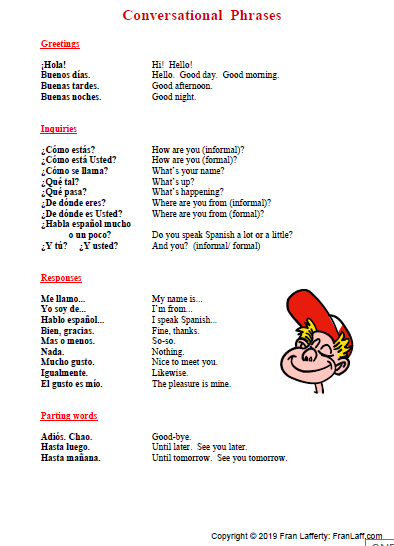How Are You In Spanish Informal : An informal way and a formal one.
How Are You In Spanish Informal : An informal way and a formal one.. You use formal speech in workplace spanish to. If you're in an informal setting, for example, speaking with a friend or a peer, then you will use encantado de conocerte. Below are the most common ways in which an interaction with a spanish speaker is likely to begin. In this lesson, we have covered the most common spanish greetings used in informal and familiar contexts. In spanish, the most formal pronoun for the second singular person is usted (you).
You can also use the informal during a conversation with close friends that are similar in age, or with spouses/significant others. If you're in an informal setting, for example, speaking with a friend or a peer, then you will use encantado de conocerte. In spanish, there are a few ways you can address you. we will keep today's article simple by focusing on the main ones, those being the tú form and the usted form. You may start a conversation with this phrase by saying hola, cómo estás? which translates to hello, how are you?. Spanish has both a formal and informal way of addressing people.

This makes asking the simple question how are you? slightly more complicated than in english.
However, in most of latin america, the formal ustedes is used regardless of the persons you're speaking to. Just as in english and other languages, there are informal ways to say how are you in spanish. This is the most common way of saying how are you in spanish. In this lesson, we have covered the most common spanish greetings used in informal and familiar contexts. Generally, in most of spain the difference between formal and informal when speaking to more than one person is the same as specified above. Across spain and latin america, this is the formal way to address people. (formal singular you) where are you from? Remember that the tu form is informal. As a question, but if you change your intonation, you can say the same thing as an answer in more informal contexts. The other one, tú, is used in informal settings. Formal vs informal — a quick guide. Learn vocabulary, terms, and more with flashcards, games, and other study tools. You should use it when you're talking to people you are friends with or people of your similar age.
Start studying review for spanish 1. How are you in russian is usually translated as как делa (kak dylah). In spanish, the most formal pronoun for the second singular person is usted (you). What's going on?]) (informal) ¿cómo van las cosas? Singular and plural forms of you usted, ud.

It's an extra thing you'll need to bear in mind as it's quite important.
This makes asking the simple question how are you? slightly more complicated than in english. Spanish has two ways to address people. Below are the most common ways in which an interaction with a spanish speaker is likely to begin. As you may know, in spanish there are two pronouns for the singular second person. Here are seven different ways in which you can say 'how are you?' in spanish: Spanish has both a formal and informal way of addressing people. If you're addressing an elder or want to be more formal, ask como esta. When you talk to older or respected people, important people, or perhaps your doctor, you probably want to show your manners. This is the most commonly used way to greet someone or say how are you doing in spanish. = ¿de dónde es (usted)? However, if you don't see usted in the phrase, it just means that we're using it implicitly. If you happen to be speaking spanish in spain, use vosotros when talking to a group of people in an informal situation, such as when you're speaking to a group of friends. For this reason, we'll be using usted in all our formal phrases above all.
If you happen to be speaking spanish in spain, use vosotros when talking to a group of people in an informal situation, such as when you're speaking to a group of friends. If you're unsure as to whether or not to use the informal, ask the other person if it's ok to use 반말 (banmal), which is the word for informal korean. Learn vocabulary, terms, and more with flashcards, games, and other study tools. The other one, tú, is used in informal settings. Here are seven different ways in which you can say 'how are you?' in spanish:

Across spain and latin america, this is the formal way to address people.
This is the most common way of saying how are you in spanish. If you're addressing an elder or want to be more formal, ask como esta. If you happen to be speaking spanish in spain, use vosotros when talking to a group of people in an informal situation, such as when you're speaking to a group of friends. A very common version of how are you in spanish is como estas with como meaning how and the verb estar meaning to be in a temporal sense. Here are seven different ways in which you can say 'how are you?' in spanish: Spanish has both a formal and informal way of addressing people. For this question, a textbook response in spanish is: If you're unsure as to whether or not to use the informal, ask the other person if it's ok to use 반말 (banmal), which is the word for informal korean. The other one, tú, is used in informal settings. You use formal speech in workplace spanish to. In spanish, we have to remember that there is a difference between using the informal or formal you. But, it's still a very good general phrase you can use with most people. However, there are different ways to ask someone how they are in russian, with some more informal while others suitable for any social setting.